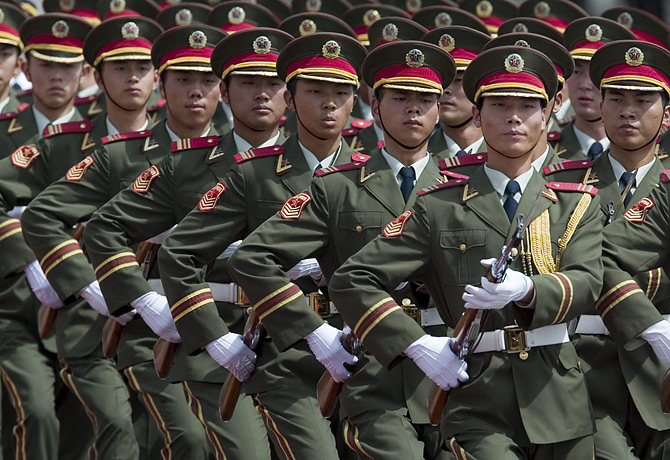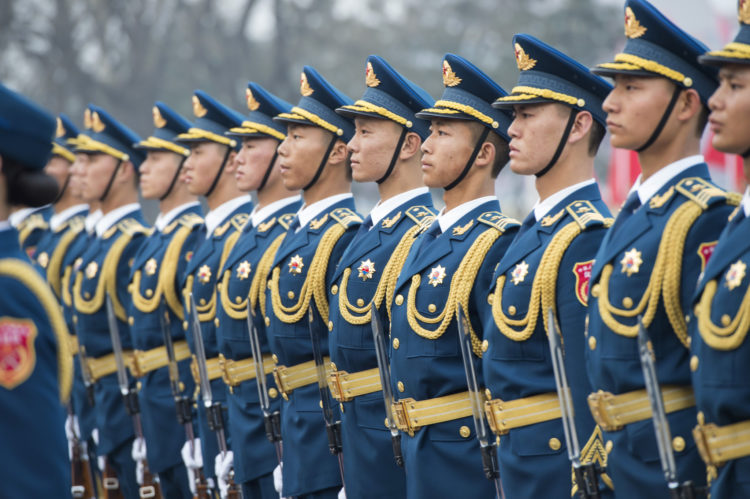Chinese power may help shape future global trade rules by facilitating negotiation processes with other nations regarding topics such as investment protection and intellectual property rights. As China’s presence continues to grow in international arenas—including business negotiations—it will likely impact how trade rules evolve over time and thus significantly shape future economic trends across multiple countries around the world.
It is clear that Chinese power will have far-reaching implications for global politics and economics both now and in the future. By challenging traditional US hegemony while deterring hostile behavior from other states; providing an avenue for diplomatic engagement, and potentially influencing future trade rules; Beijing will continue to play an increasingly important role in shaping our collective fate on this planet well into this century.
How Does This Affect US-China Relationships and Global Stability?
The rapid expansion of China’s military capabilities poses a direct challenge to the US-led global order and threatens global stability. Some claim that the United States is no longer the sole superpower, as China is rapidly gaining ground on many fronts. This has shifted the balance of power in favor of Beijing, which has now become a key player in the international arena.
The most immediate consequence of this shift is the deterioration of US-China relations and an escalating arms race between China and the United States. As each side attempts to gain a strategic advantage over one another, military tensions have increased significantly in recent years. The two sides have clashed over Chinese maritime claims in the South China Sea, technology theft, human rights violations, and US arms sales to Taiwan.
In addition to increased military tensions and heightened risk for conflict, global stability has broader implications. With a more assertive Chinese military comes an expanded list of demands that Beijing can make of other countries in its vicinity. This could lead to destabilizing effects, particularly if others do not meet these demands or if there is resistance from regional adversaries such as India or Japan. Moreover, it could embolden China to pursue more aggressive actions, such as economic coercion or outright territorial grabs, that would have far-reaching consequences across Asia and beyond.
There is no clear answer on how best to manage this shift in power dynamics between China and the United States. The Biden administration has adopted a “principled approach” based on diplomacy and deterrence through solid alliances with allies such as Japan and South Korea and economic pressure through tariffs and sanctions against Beijing as necessary. However, this course may not be enough to shift the balance back towards competition rather than conflict or all-out war between both countries; therefore, Washington must continue working closely with its partners in Asia on issues such as regional security architecture that could help maintain peace while tempering Chinese ambitions at the same time.
Strategically speaking, Washington must also find ways to counterbalance Beijing’s growing influence without provoking aggressive behavior from China — something that can only be achieved via collaboration between Washington and its alliance partners in the Asia Pacific region (APR), so they can act together with strength when needed while avoiding miscalculations that could further escalate tensions with Beijing.
Washington should prioritize strengthening its defense capabilities while focusing more heavily on diplomacy, which ensures that Washington can apply meaningful diplomatic pressure whenever necessary.
Potential Benefits & Risks Associated with Chinese Expansionism
China’s growing influence and military power have significant potential benefits and risks associated with its expansionism. On the one hand, increasing Chinese strategic power could help maintain stability in the East Asian region and potentially balance US dominance. However, on the other hand, Chinese expansionism could lead to heightened competition between the two countries and a decreased respect for international norms and laws.
One possible benefit of Chinese expansionism is increased economic prosperity for both parties involved. Through increased trade, investment, and resource sharing, China and its neighboring countries may experience an upsurge in economic growth due to stronger partnerships formed through Chinese initiatives. In addition, international peace could be enhanced due to improved relations between China’s neighbors.

However, there are also risks associated with China’s increasing military power that must be considered when assessing potential benefits. For example, greater expansionism might result in increased military spending. This could destabilize regional arms races as other nations attempt to acquire nuclear weapons or other advanced weaponry to match or surpass China’s capabilities. In addition, the potential threat posed by China’s naval forces has also been noted among experts. Such investments would thus divert resources away from areas such as public health or education, where they could be used more productively.
Furthermore, if unchecked by any international powers such as the United States or global organizations like NATO, this military strength may allow Beijing to more easily ignore specific international laws or norms (Khan, 2020). This could lead to further human rights violations within regions surrounding China, particularly those located along disputed borders. It could also give rise to aggressive postures toward other nations, including those found throughout East Asia, like Taiwan or the Korean Peninsula.
There exists a risk that increased Chinese influence will inspire similar expansionist policies from other countries within the region. This may set off a chain reaction where countries flex their militaristic muscles to gain territory and allies at the expense of their neighbors. As such, global powers like the United States must monitor these developments closely to mitigate such actions before they reach a critical level.
Suggestions for Future Actions by Nations Involved
Given China’s rapid military buildup and its ambitions to become a “world-class” military power by 2049, the nations involved have an immediate responsibility to respond appropriately. Specifically, the United States and its regional allies should act swiftly to maintain regional security and stability. According to research by the Center for Strategic and International Studies (CSIS), potential strategies involve strong diplomatic measures, improved maritime domain awareness, and strengthened defense ties with regional allies like India, Japan, and South Korea.
First, diplomatic measures are essential for managing any conflict in the region. The United States should enhance diplomatic communication with China at both bilateral and multilateral levels to avoid miscalculations or misunderstandings between both countries. Additionally, nations must engage in constructive dialogue instead of relying on deterrence alone. This could reduce strategic mistrust between the two sides by allowing them to build confidence through mutual understanding.
Second, improved maritime domain awareness should also be a priority for nations involved better to monitor China’s naval activities in the region. This could involve joint exercises between allied navies to improve coordination against potential threats from Chinese vessels and enhanced intelligence-gathering operations across the region. Moreover, nations can invest resources in developing long-range maritime surveillance systems such as unmanned aerial vehicles (UAVs) or satellites that can track Chinese military assets more effectively than before.
Third, strengthening defense ties with regional allies is essential for regional security, given China’s rapidly expanding military capabilities. For instance, the United States should deepen its military alliances with India, Japan, and South Korea by engaging them regularly through joint exercises or strategic dialogues regarding collective defense issues. This will not only reassure these partners but also show Beijing that they will only be allowed to exercise unchecked power in their respective regions with consequences from other players involved.
Finally, nations should actively pursue arms control agreements where possible to prevent an arms race from escalating into a full-scale confrontation between China and other countries involved. The US-Russia New Start Treaty is an excellent example of how arms control agreements can help temper dangerous escalations between rival states by setting limits on nuclear weapons stockpiles. Similarly, it may be possible for nations involved here to engage in meaningful talks aimed at reducing tensions through negotiated limits on armaments produced within their respective forces.
Overall, it is clear that future actions taken by all sides must involve more than just posturing or nuclear saber-rattling if they are serious about maintaining stability and security within the region while simultaneously avoiding open conflict. By following some of the guidelines we’ve written above, governments can take concrete steps towards achieving this goal while potentially laying the foundations for peaceful coexistence among their respective societies moving forward.










COMMENTS